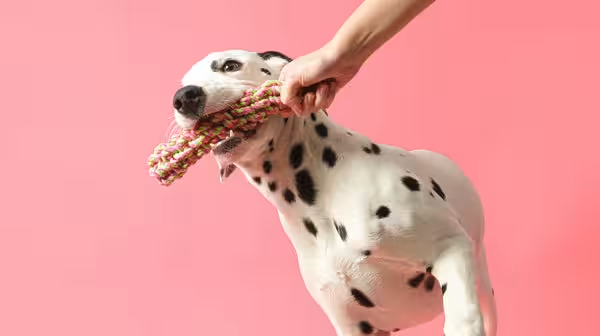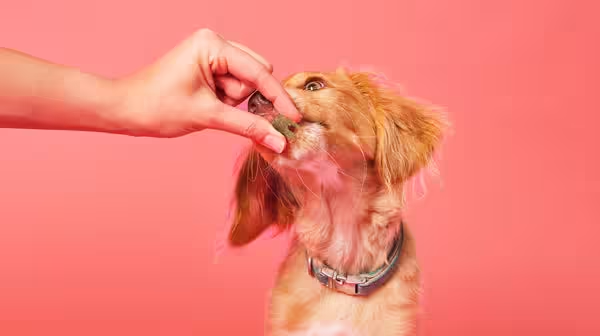When you bring home your first puppy, you go through a magical transformation - from your average Joe, to puppy owner extraordinaire! But this transformation doesn’t happen easily, or overnight. It takes a lot of preparation, time, energy, effort and a whole lot of patience.
To get steps ahead of the puppy game, it’s good to kick off the necessary preparations before your pup comes home. But with SO much to consider and think about - where do you start? Well, worry not, we pooch experts are here to ensure you start your new puppy owner life with your best foot forward.
Read on to explore our top tips and advice for being a new puppy owner, what you must consider to help you transform into the best possible owner and how it will help shape them into their best self. Notepad at the ready? Let’s get into it!
Preparing your home
Before your pup even comes home, the transformation into a top puppy owner can already start. Not only do you need to get yourself mentally and physically prepared - but your home too! After all, it won’t be just your home anymore, but the home to a rambunctious pup who’s discovering the world (mainly through their mouth).
So before your new puppy comes and turns your life upside down (and we mean that in the best way possible), here are a few things you can consider preparing to help you be an A* puppy owner.

Puppy proofing your home
Your puppy’s new home should be a safe space - free of anything that might bring them harm or that they can get their little teeth around.
A puppy’s devotion to causing chaos should never be underestimated, and when puppy proofing your home, it’s best to cover all bases to avoid any accidents. Here are a few things you can do around the home to make sure it’s 100% puppy-friendly:
Hide any exposed wiring
Block off tight, small, puppy sized spaces
Put anything of sentimental or monetary value out of harm's way
Puppy proof the garden - blocking off any gaps, checking for poisonous plants, setting up designated area
Invest in a stair/puppy gate
Cover up sharp edges and corners
Basic supplies
Some breeders will send you away with a stocked puppy pack that contains everything you need to get started with the best paw forward! But if you’re looking to stock-up on the basic necessities before your pup comes home, the following make for a great starter pack:
A leash and collar - preferably a soft, fabric one for young pups
A dog towel
Dog bowls and a feeding mat
A grooming kit including puppy-safe shampoo and a toothbrush kit
Puppy-friendly treats
Bedding - this can be a mixture of blankets, baskets, a crate, or a play pen
Soft, cuddly toys for companionship
Enrichment toys for mental stimulation and distraction

How to take care of a puppy
When you bring your puppy home, it’s up to you to have their back, providing them with the utmost care to ensure they’re safe, happy and healthy. So, as a new puppy owner, what must you consider regarding their health?
Registering with a vet. Have a search around your local area for veterinary surgeries. You’ll often find a mixture of chain and independent practices, and with the right research, exploring reviews and asking around - you’ll find the right one for you.
Insurance. To make sure you and your pup are protected if, heaven forbid, something happens to them, pet insurance is crucial! Pet insurance can come in many forms, and vary in types of cover. Some cover types can help with surgery costs, medications, or the difficult time when they come to crossing the rainbow bridge. Explore our guide to dog insurance to find out more about insuring your pooch, and the importance of it.
Health checks. Your chosen vet will often remind you about your pup’s health checks. The younger your pup is, the more health checks they’ll need - but these will become less frequent as they get older. During health checks, a vet takes a general look over your pup to make sure they’re in tip top shape.
Vaccinations. Young puppies will need a few rounds of vaccinations in the few months of their life, especially before they can go out into the big wide world! As they get older, this will reduce to annual vaccinations. Vaccinations are crucial to young pups, especially when they have immature and developing immune systems. Be sure to explore our expert guide to puppy vaccinations to learn more.
Worming. Alongside vaccinations, worming is very important when it comes to caring for your puppy and as they grow into adulthood. Puppies in particular are very susceptible to worms, and not only is it important to stay on top of worming, but to also make yourself aware of the signs and symptoms. To scrub up on your knowledge about worms in dogs and what to look out for, be sure to check out our article, ‘Everything you need to know about your puppy’s poop’.
If the new puppy owner jitters are settling in - don’t worry! Pooch & Mutt have your back. For all things puppy (including everything from training to grooming) explore our very own Puppy Hub . Packed with information, expert guidance and tips and tricks, you’ll be a pro in no time.
For peace of mind on their puppy diet , we’ve got you covered there too! From puppy to senior, we have a huge range of healthy, nutritional dog food , treats and dental sticks to keep your pooch looking and feeling great.
Puppy
Vet-recommended food and supplements, perfect for healthy pup growth and development
-

 from
fromCurrent price: £8.99
Puppy Complete Dry Superfood -

 from
fromCurrent price: £2.49
Puppy Wet Food -

 from
fromCurrent price: £3.99
Puppy Beef Jerky Training Treat -

 from
fromCurrent price: £35.49
Puppy Complete Bundle -

 from
fromCurrent price: £10.49
Meaty Treats Taster Pack -

 from
fromCurrent price: £11.49
Salmon Oil For Dogs -

 from
fromCurrent price: £3.99
Calming Postbiotic Meaty Treats -

 from
fromCurrent price: £3.99
Dental Postbiotic Meaty Treats -

 from
fromCurrent price: £5.99
Health & Digestion Bone Broth -

 from
fromCurrent price: £5.99
Calm & Relaxed Bone Broth -

 from
fromCurrent price: £3.99
Peanut Butter Postbiotic Nutty Treats -

 from
fromCurrent price: £15.99
Dental Powder For Dogs




